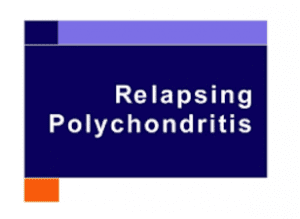Relapsing Polychondritis, What Is R.P., Symptoms, Causes, Treatment and Support
Relapsing Polychondritis, What Is R.P., Symptoms, What Causes, Treatment, And Support
What Is Relapsing Polychondritis?
Relapsing Polychondritis is a chronic rare cartilage disease that is characterized by recurrent episodes of inflammation of the cartilage of various body tissues.
The rare disease Relapsing Polychondritis is often difficult to diagnosis.
The most common symptom of Relapsing Polychondritis is the sudden cause of extreme pain to the inflamed cartilage area.
What Are The Symptoms Of Relapsing Polychondritis?
-
Red Ear; tenderness, swelling, red rash (a pimple like) breakouts and redness in one or both ears. Relapsing Polychondritis has also been known to be called, “Red Ear”. The lobe of the ear does not have cartilage and is not does not have inflammation.
-
Inflammation
-
Pain
-
Fatigue
-
Tenderness can also affect the nose, throat, joints and eyes
-
Shortness of breath
-
Nausea
Relapsing Polychondritis may affect any area of your body that has cartilage
- Inflammation of the ears and nose can cause the body’s cartilage to weaken and result in a saddle nose and floppy deformed ears. Inflammation of the inner ear may cause hearing impairments, nausea, and loss of balance.
- Windpipe or trachea inflammation can lead to throat intense pain, loss of voice (hoarseness) and trouble breathing may develop. Some patients with serve Relapsing Polychondritis in the trachea area may require assistance to breathe.
- Joint Inflammation (arthritis) may cause stiffness, swelling, redness and joint pain. If a Relapsing Polychondritis patient experiences joint pain it may make it difficult to perform everyday tasks.
- Inflammation of joints may include the hands, knees, ankles, wrists, and.
- Eye inflammation can be mild or severe and can damage vision. The steroids that treat the rare disease Relapsing Polychondritis can cause cataracts.
- Fever may develop as the body struggles with inflammation
- Fatigue
- Weight loss
What Causes Relapsing Polychondritis?
The causes or triggers of Relapsing Polychondritis are unknown.
Some medical experts suspect that environment may play a role. The medical community suspects that Relapsing Polychondritis is related to with other inflammatory diseases.
In 50 percent of Relapsing Polychondritis patients, there is confirmation of thrombocytosis, leukocytosis, and normochromic normocytic anemia.
How To Test For Relapsing Polychondritis
If a Physician suspects or confirms Relapsing Polychondritis the doctor may order these lab tests:
A doctor could recognize that a patient may have the rare disease, Relapsing Polychondritis by red, inflammation of the cartilage.
If a physician suspects a patient has Relapsing Polychondritis then they may order these lab tests:
- ESR Elevated Erythrocytes Sedimentation Rate
- C-Reactive Protein
The above lab tests may show if there is inflammation in the body.
Relapsing Polychondritis has links to many multisystemic diseases.
If the doctor suspects or confirms Relapsing Polychondritis the physician may also order these lab tests:
- (CBC) Complete blood cell count
- (ANA) Antinuclear antibody
- (ANCA) Antineutrophil cytoplasmic antibody
- Metabolic panel
- Liver transaminase
- Serum creatinine
- Serum alkaline phosphatase studies
- Cryoglobulins
- Viral hepatitis panel
The doctor may order a Pulmonary Function Test to check your lung function.
An ECG Echocardiogram may be ordered to see if you have signs of vasculitis.
Click on the following link to read:
What Type Of Doctor Treats Relapsing Polychondritis?
A Rheumatologist is the type of medical doctor that would treat Relapsing Polychondritis.
What Medication Is Used To Treat Relapsing Polychondritis?
There are medications to help place Relapsing Polychondritis into remission.
Steroids are usually the first prescription medication to treat Relapsing Polychondritis.
The steroid Prednisone is administered in the acute phase and is tapered for maintenance.
Relapsing Polychondritis severe flares may require additional Prednisone.
Most Relapsing Polychondritis patients require a low daily dose of prednisone for maintenance.
Other Prescriptions Medications Reported To Control Relapsing Polychondritis Symptoms:
-
Dapsone, my story using Dapsone- Are You Aware You Take Medication To Treat Leprosy?
-
Azathioprine
-
Methotrexate
-
Cyclophosphamide
-
Cyclosporin
Is There A Cure For Relapsing Polychondritis?
There is no cure for Relapsing Polychondritis.
You may find this Relapsing Polychondritis YouTube Video Insightful
My Life With Relapsing Polychondritis
Relapsing Polychondritis Support Groups
Relapsing Polychondritis Foundation
http://www.relapsingpolychondritis.org/support-groups/
I hope Relapsing Polychondritis, What Is R.P., Symptoms, Causes, Treatment and Support post has been useful.
You may also find these web links helpful:
Resources:
https://en.wikipedia.org/wiki/Relapsing_polychondritis
http://emedicine.medscape.com/article/331475-treatment
https://rarediseases.org/rare-diseases/relapsing-polychondritis/
https://rarediseases.info.nih.gov/diseases/7417/relapsing-polychondritis
You can read about my experiences with the rare disease, Relapsing Polychondritis on the HypoGal Blog.
Please, Like, HypoGal on Facebook.
If you enter your email address at the bottom of this page you can receive HypoGal’s updates. It’s Free! 🙂


